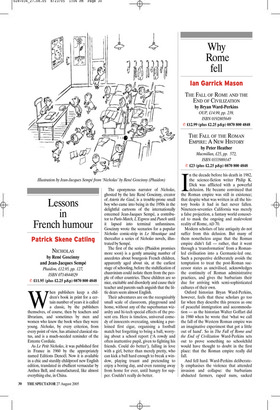Lessons in French humour
Patrick Skene Catling
NICHOLAS by René Goscinny and Jean-Jacques Sempé Phaidon, £12.95, pp. 127, ISBN 0714844829 ✆ £11.95 (plus £2.25 p&p) 0870 800 4848 When publishers keep a children’s book in print for a certain number of years it is called a classic, by the publishers themselves, of course, then by teachers and librarians, and sometimes by men and women who knew the book when they were young. Nicholas, by every criterion, from every point of view, has attained classical status, and is a much-needed reminder of the Entente Cordiale.
As Le Petit Nicholas, it was published first in France in 1960 by the appropriately named Editions Denoël. Now it is available in a chic and sturdily childproof new English edition, translated in ebullient vernacular by Anthea Bell, and manufactured, like almost everything else, in China. The eponymous narrator of Nicholas, ghosted by the late René Goscinny, creator of Asterix the Gaul, is a trouble-prone small boy who came into being in the 1950s in the delightful cartoons of the internationally esteemed Jean-Jacques Sempé, a contributor to Paris-Match, L’Express and Punch until it lapsed into terminal unfunniness. Goscinny wrote the scenarios for a popular Nicholas comic-strip in Le Moustique and thereafter a series of Nicholas novels, illustrated by Sempé.
The first of the series (Phaidon promises more soon) is a gently amusing number of anecdotes about bourgeois French children, apparently aged about six, at the earliest stage of schooling, before the stultification of chauvinism could isolate them from the people of other countries. These children are so nice, excitable and disorderly and cause their teacher and parents such anguish that the little dears seem almost English.
Their adventures are on the recognisably small scale of classroom, playground and home, without any of the superhuman wizardry and hi-tech special effects of the present era. Here is timeless, universal comedy of innocents overeating, smoking a purloined first cigar, organising a football match but forgetting to bring a ball, worrying about a school report (‘A rowdy and often inattentive pupil, given to fighting his friends. Could do better’), falling in love with a girl, better than merely pretty, who can kick a ball hard enough to break a window, playing truant and pretending to enjoy a boring day, and even running away from home for ever, until hungry for supper. Couldn’t really do better.











































 Previous page
Previous page